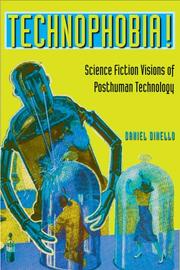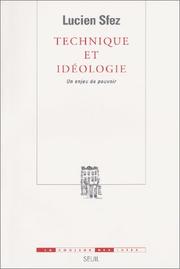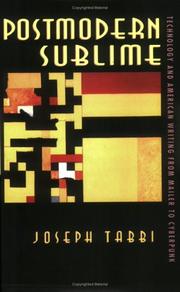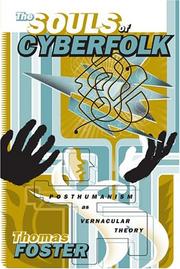| Listing 1 - 10 of 12 | << page >> |
Sort by
|

ISBN: 9780292709867 9780292709546 0292709862 0292709544 0292796641 Year: 2005 Publisher: Austin : University of Texas Press,
Abstract | Keywords | Export | Availability | Bookmark
 Loading...
Loading...Choose an application
- Reference Manager
- EndNote
- RefWorks (Direct export to RefWorks)
Techno-heaven or techno-hell? If you believe many scientists working in the emerging fields of twenty-first-century technology, the future is blissfully bright. Initially, human bodies will be perfected through genetic manipulation and the fusion of human and machine; later, human beings will completely shed the shackles of pain, disease, and even death, as human minds are downloaded into death-free robots whereby they can live forever in a heavenly "posthuman" existence. In this techno-utopian future, humanity will be saved by the godlike power of technology. If you believe the authors of science fiction, however, posthuman evolution marks the beginning of the end of human freedom, values, and identity. Our dark future will be dominated by mad scientists, rampaging robots, killer clones, and uncontrollable viruses. In this timely new book, Daniel Dinello examines "the dramatic conflict between the techno-utopia promised by real-world scientists and the techno-dystopia predicted by science fiction." Organized into chapters devoted to robotics, bionics, artificial intelligence, virtual reality, biotechnology, nanotechnology, and other significant scientific advancements, this book summarizes the current state of each technology, while presenting corresponding reactions in science fiction. Dinello draws on a rich range of material, including films, television, books, and computer games, and argues that science fiction functions as a valuable corrective to technological domination, countering techno-hype and reflecting the "weaponized, religiously rationalized, profit-fueled" motives of such science. By imaging a disastrous future of posthuman techno-totalitarianism, science fiction encourages us to construct ways to contain new technology, and asks its audience perhaps the most important question of the twenty-first century: is technology out of control?
Science fiction --- Technology in literature. --- Science-fiction --- Technologie dans la littérature --- History and criticism. --- Histoire et critique
Book
Year: 1968 Volume: 11 Publisher: Basel : F. Reinhardt,
Abstract | Keywords | Export | Availability | Bookmark
 Loading...
Loading...Choose an application
- Reference Manager
- EndNote
- RefWorks (Direct export to RefWorks)
Book
ISBN: 9789601211336 9601211330 Year: 2002 Publisher: Thessaloniki : University Studio Press,
Abstract | Keywords | Export | Availability | Bookmark
 Loading...
Loading...Choose an application
- Reference Manager
- EndNote
- RefWorks (Direct export to RefWorks)
Book
Year: 1987 Volume: 42 Publisher: Marbach am Neckar : Deutsche Schillergesellschaft,
Abstract | Keywords | Export | Availability | Bookmark
 Loading...
Loading...Choose an application
- Reference Manager
- EndNote
- RefWorks (Direct export to RefWorks)
Literature and technology --- Industries in literature --- Technology in literature --- German literature --- Littérature et technologie --- Industrie dans la littérature --- Technologie dans la littérature --- Littérature allemande --- Exhibitions. --- Expositions --- Deutsches Literaturarchiv (Marbach am Neckar, Germany)

ISBN: 2020412969 Year: 2002 Publisher: Paris : Seuil,
Abstract | Keywords | Export | Availability | Bookmark
 Loading...
Loading...Choose an application
- Reference Manager
- EndNote
- RefWorks (Direct export to RefWorks)
Technology and state --- Technology --- Communication and technology --- Technology in literature --- Politique scientifique et technique --- Technologie --- Communication et technologie --- Technologie dans la littérature --- Philosophy --- Philosophie --- Technology and state. --- Philosophy. --- Aspect politique. --- Aspect sociologique. --- Philosophie. --- Technologie dans la littérature --- State and technology --- Government policy --- Technology and civilization --- Endowment of research --- Science and state
Book
ISBN: 9780415989510 0415989515 9780203873892 0203873890 9781135255121 9781135255169 9781135255176 9781138828384 Year: 2010 Publisher: New York, N.Y. Routledge
Abstract | Keywords | Export | Availability | Bookmark
 Loading...
Loading...Choose an application
- Reference Manager
- EndNote
- RefWorks (Direct export to RefWorks)
Thematology --- science fiction --- technologie --- jeugdliteratuur --- Children's stories --- Science fiction --- Children --- Technology in literature. --- Histoires pour enfants --- Science-fiction --- Enfants --- Technologie dans la littérature --- Themes, motives. --- History and criticism. --- Books and reading. --- Thèmes, motifs --- Histoire et critique --- Livres et lecture --- Children's stories. --- Science fiction. --- Technologie dans la littérature. --- Livres et lecture. --- Histoire et critique. --- Thèmes, motifs.
Book
ISBN: 9780745662404 0745662404 9780745662411 0745662412 Year: 2014 Publisher: Cambridge ; Malden : Polity,
Abstract | Keywords | Export | Availability | Bookmark
 Loading...
Loading...Choose an application
- Reference Manager
- EndNote
- RefWorks (Direct export to RefWorks)
"This timely book examines the rise of posthumanism as both a material condition and a developing philosophical-ethical project in the age of cloning, gene engineering, organ transplants and implants. Nayar first maps the political and philosophical critiques of traditional humanism, revealing its exclusionary and 'speciesist' politics that position the human as a distinctive and dominant life form. He then contextualizes the posthumanist vision which, drawing upon biomedical, engineering and techno-scientific studies, concludes that human consciousness is shaped by its co-evolution with other life forms, and our human form inescapably influenced by tools and technology. Finally the book explores posthumanism's roots in disability studies, animal studies and bioethics to underscore the constructed nature of 'normalcy' in bodies, and the singularity of species and life itself. As this book powerfully demonstrates, posthumanism marks a radical reassessment of the human as constituted by symbiosis, assimilation, difference and dependence upon and with other species. Mapping the terrain of these far-reaching debates, Posthumanism will be an invaluable companion to students of cultural studies and modern and contemporary literature."--page 4 of cover.
Humanism. --- Humanistic ethics. --- Aesthetics. --- Semiotics. --- Literature and technology. --- Technology in literature. --- Humanisme --- Morale humaniste --- Esthétique --- Sémiotique --- Littérature et technologie --- Technologie dans la littérature --- Littérature et technique --- Humanisme. --- Morale humaniste. --- Esthétique. --- Sémiotique. --- Littérature et technologie. --- Technologie dans la littérature. --- Esthétique --- Sémiotique --- Littérature et technologie --- Technologie dans la littérature --- Humanism --- Humanistic ethics --- Aesthetics --- Semiotics --- Literature and technology --- Technology in literature --- Industry and literature --- Technology and literature --- Technology --- Semeiotics --- Semiology (Linguistics) --- Semantics --- Signs and symbols --- Structuralism (Literary analysis) --- Beautiful, The --- Beauty --- Esthetics --- Taste (Aesthetics) --- Philosophy --- Art --- Criticism --- Literature --- Proportion --- Symmetry --- Humanist ethics --- Ethics --- Classical education --- Classical philology --- Philosophical anthropology --- Renaissance --- Psychology --- 82:62 --- 82:62 Literatuur en technologie --- Literatuur en technologie --- Littérature et technique. --- Radio broadcasting Aesthetics --- Esthétique. --- Sémiotique. --- Littérature et technique. --- Littérature et technologie. --- Technologie dans la littérature.

ISBN: 0801430747 9780801430749 0801483832 1501717642 Year: 2018 Publisher: Ithaca, NY : Cornell University Press,
Abstract | Keywords | Export | Availability | Bookmark
 Loading...
Loading...Choose an application
- Reference Manager
- EndNote
- RefWorks (Direct export to RefWorks)
Focusing on works by Norman Mailer, Thomas Pynchon, Joseph McElroy, and Don DeLillo, Joseph Tabbi finds that a simultaneous attraction to and repulsion from technology has produced a powerful new mode of modern writing-the technological sublime.
American literature --- Thematology --- anno 1900-1999 --- Sublieme [Het ] in de literatuur --- Sublime [Le ] dans la littérature --- Sublime [The ] in literature --- Technologie dans la littérature --- Technologie in de literatuur --- Technology in literature --- Literature and technology --- Postmodernism (Literature) --- Sublime, The, in literature. --- Technology in literature. --- Littérature américaine --- Littérature et technologie --- Postmodernisme (Littérature) --- Sublime dans la littérature --- History and criticism. --- History --- Histoire et critique --- Histoire --- Mailer, Norman --- Littérature américaine --- Littérature et technologie --- Postmodernisme (Littérature) --- Sublime dans la littérature --- Technologie dans la littérature --- Mailer, Norman. --- 20th century --- History and criticism --- United States --- McElroy, Joseph --- DeLillo, Don --- Criticism and interpretation --- Gibson, William --- Acker, Kathy --- Sterling, Bruce --- Calvino, Italo

ISBN: 3050031948 9042006390 305007437X Year: 1998 Publisher: Berlin : Akademie-Verlag,
Abstract | Keywords | Export | Availability | Bookmark
 Loading...
Loading...Choose an application
- Reference Manager
- EndNote
- RefWorks (Direct export to RefWorks)
Umfassende Stoffbeherrschung des Autors, staunenswerte Belesenheit über die ganze antike Literatur hin und souveräne Beherrschung der weitläufigen modernen Forschung kennzeichnen das umfangreiche Werk. Ebenso ist der innovative Charakter der Darstellung hervorzuheben: sie hilft nicht nur der Erforschung von Technikgeschichte, sondern von antiker Geschichte überhaupt entschieden weiter.
Didactic literature, Greek --- Didactic literature, Latin --- Literature and technology --- Technology --- Technology in literature. --- Littérature didactique grecque --- Littérature didactique latine --- Littérature et technologie --- Technologie --- Technologie dans la littérature --- History and criticism. --- History and criticism --- History --- Histoire et critique --- Histoire --- -Didactic literature, Latin --- -Literature and technology --- -Technology --- -Technology in literature --- Applied science --- Arts, Useful --- Science, Applied --- Useful arts --- Science --- Industrial arts --- Material culture --- Industry and literature --- Technology and literature --- Latin didactic literature --- Latin literature --- Greek didactic literature --- Greek literature --- -History --- -Didactic literature, Greek --- Technology in literature --- Littérature didactique grecque --- Littérature didactique latine --- Littérature et technologie --- Technologie dans la littérature

ISBN: 9780816634064 9780816634057 0816634068 081663405X 1452935238 Year: 2005 Volume: 13 Publisher: Minneapolis : University of Minnesota Press,
Abstract | Keywords | Export | Availability | Bookmark
 Loading...
Loading...Choose an application
- Reference Manager
- EndNote
- RefWorks (Direct export to RefWorks)
Science fiction, American --- Cybernetics in literature. --- Literature and technology --- Technology in literature. --- Cyborgs in literature. --- Science-fiction américaine --- Cybernétique dans la littérature --- Littérature et technologie --- Technologie dans la littérature --- Cyborgs dans la littérature --- History and criticism. --- Histoire et critique --- 82:62 --- Literatuur en technologie --- 82:62 Literatuur en technologie --- Science-fiction américaine --- Cybernétique dans la littérature --- Littérature et technologie --- Technologie dans la littérature --- Cyborgs dans la littérature --- Cybernetics in literature --- Cyborgs in literature --- Technology in literature --- Industry and literature --- Technology and literature --- Technology --- History and criticism
| Listing 1 - 10 of 12 | << page >> |
Sort by
|

 Search
Search Feedback
Feedback About UniCat
About UniCat  Help
Help News
News